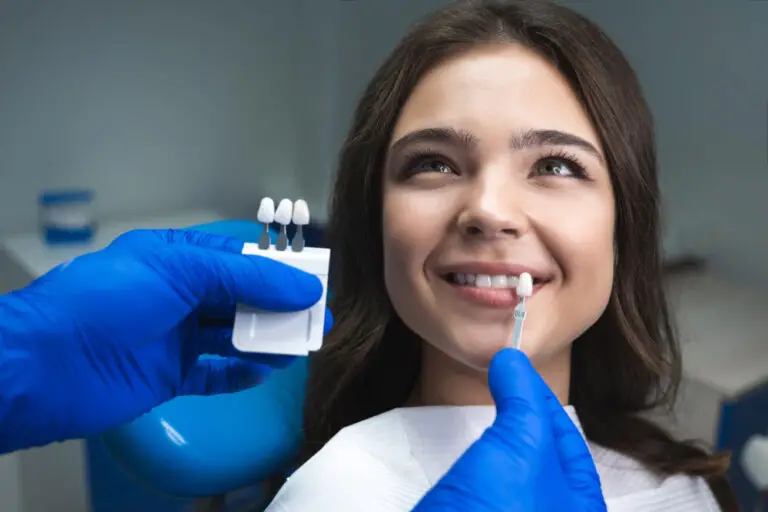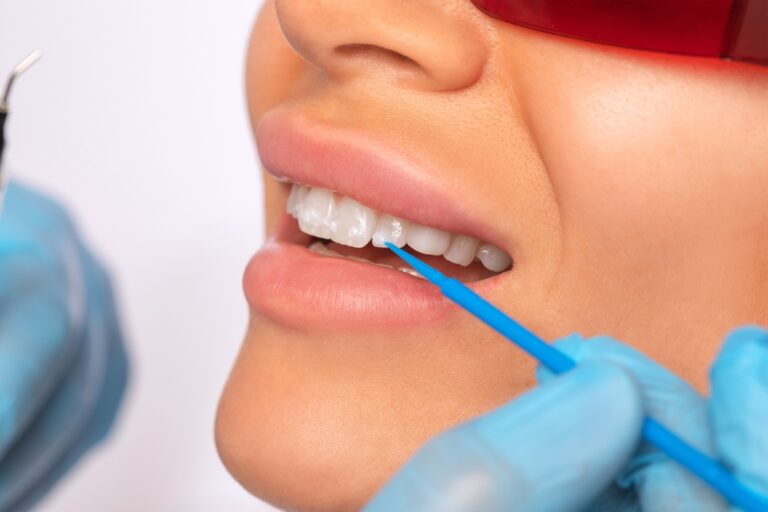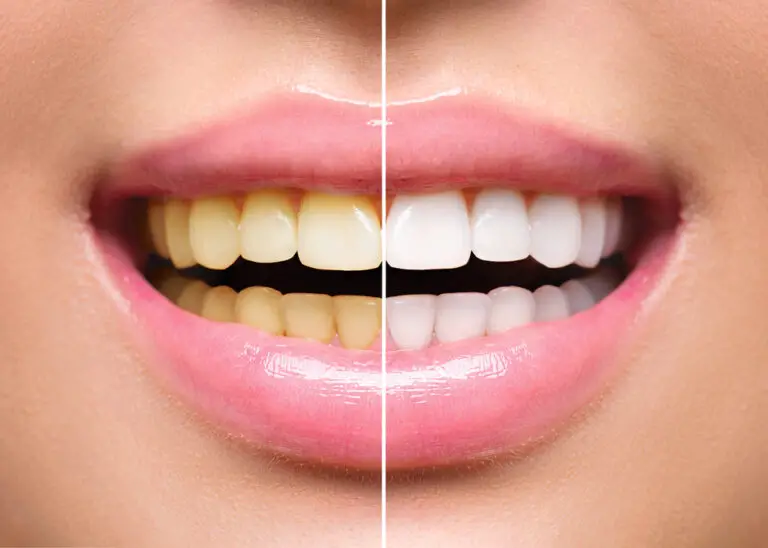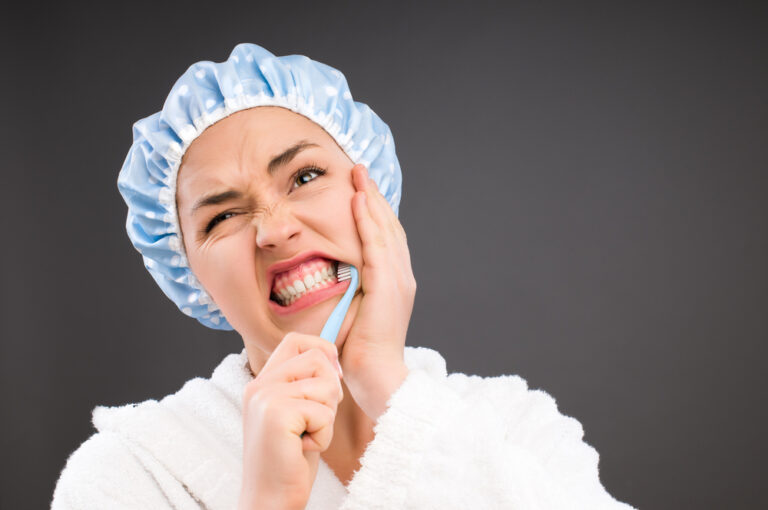Losing teeth is a natural part of development for German Shepherd puppies, but it can also happen later in adulthood for several reasons. In this comprehensive article, we will explore the teething process in German Shepherds, signs of teething, timeline, caring for a puppy losing teeth, causes of tooth loss in adults, potential problems it can lead to, and when to seek veterinary dental care.
Deciduous Teeth in German Shepherd Puppies
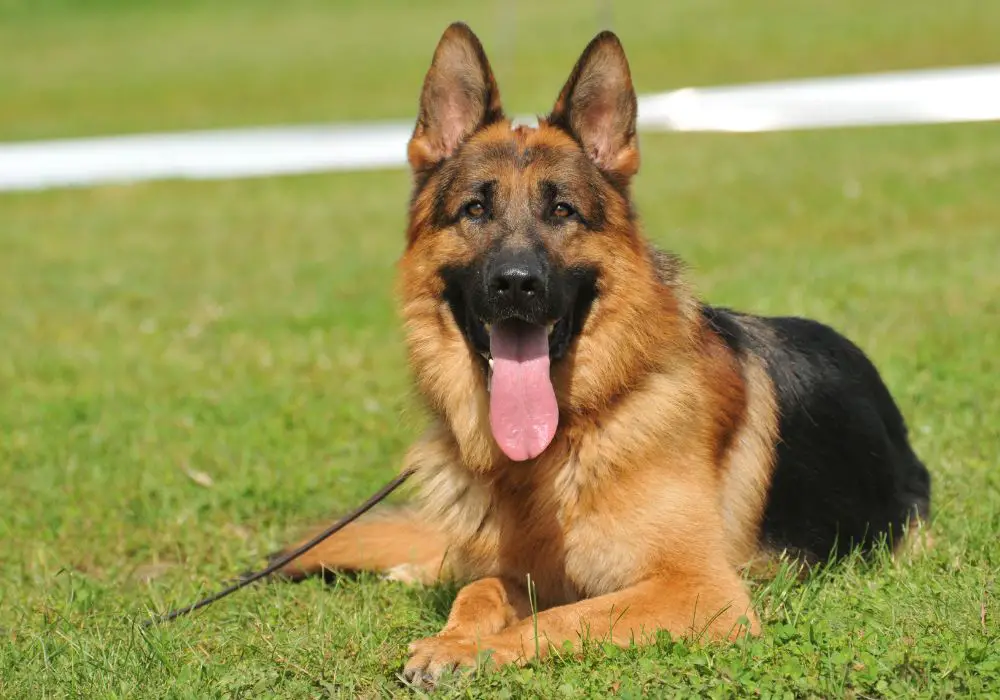
German Shepherd puppies are born toothless. At around 3-4 weeks of age, their first set of milk teeth or deciduous teeth will start to erupt through the gums. These are small, sharp little teeth that enable the puppy to start eating solid food and exploring their world with their mouth.
By 6-8 weeks old, the pup will have a full set of 28 deciduous or baby teeth comprised of:
- 12 Incisors – The small front teeth used for biting and gnawing. German Shepherds have 6 on top and 6 on bottom.
- 4 Canines – These are the fangs, located next to the incisors. Two on top and two on bottom. They are slightly larger than the incisors.
- 12 Premolars – Located along the sides of the jaw behind the canine teeth. Six premolars are on the top on each side and 6 on the bottom.
These deciduous premolars have multiple cusps for chewing food, unlike the single-cusped adult premolars.
So in total, German Shepherd puppies have 28 temporary puppy teeth by around 2 months of age – 12 incisors, 4 canines, and 12 premolars. While these teeth are small, they are sharp and enable the puppy to bite, tear, and chew their food.
Why Puppies Have Milk Teeth
Puppies have a set of deciduous or milk teeth prior to their permanent adult teeth for several reasons:
- They erupt earlier, allowing the puppy to start eating solid foods between 3-8 weeks of age.
- They are smaller in size, fitting the puppy’s tiny mouth and jaws.
- Their short roots allow them to be more easily pushed out by erupting permanent teeth later on.
- It allows adult teeth to ultimately erupt in proper alignment for optimal bite function.
So in essence, milk teeth serve as “place holders” that allow the puppy to feed, explore their surroundings, and teethe properly until they are old enough for their larger 42 permanent teeth to come in.
When Do German Shepherds Start Losing Their Deciduous Teeth?
The first deciduous teeth start becoming loose and falling out around 4-6 months of age in German Shepherd puppies. This allows the larger, stronger permanent teeth to erupt into place.
During this time, you may find small puppy teeth on the floor as your German Shepherd loses them naturally while playing and chewing on toys. The roots of the deciduous teeth begin to reabsorb or dissolve away as the permanent replacements develop underneath the gums.
Why German Shepherds Lose Their Milk Teeth
German Shepherds lose their sharp little puppy teeth for several important reasons:
- The permanent teeth developing underneath start applying pressure to the roots, causing the deciduous teeth to loosen and fall out.
- The larger size of the incoming permanent teeth push the milk teeth out to make room in the jaws and allow proper alignment.
- The puppy teeth have short, fragile roots in the tooth sockets which makes them easier to push out.
- Retaining the smaller milk teeth long-term would lead to malocclusion and dental crowding issues.
So essentially, losing the deciduous teeth enables the adult teeth to come into place in a functional biting alignment. This transition is a necessary and normal part of a puppy’s oral development.
Timeline of Puppy Teeth Loss and Adult Teeth Eruption
The process of puppy teeth falling out and being replaced by permanent adult teeth typically spans from 4-7 months of age in German Shepherds. However, it’s a gradual process with different teeth erupting at different times.
Here is an overview of the timeline:
12-16 weeks
- The incisor (front) puppy teeth become loose and fall out as the adult incisors begin pushing through the gums.
16-20 weeks
- The canine teeth (fangs) and some of the premolars start coming in, replacing the milk teeth.
- This is typically the most intense teething period as the sharper adult canines erupt. Significant discomfort and increased chewing behaviors are observed.
20-24 weeks
- At around 5 months old, all or nearly all of the puppy teeth have fallen out.
- Some swelling and soreness may still be present as the last of the new teeth finish erupting through the gums.
24-28 weeks
- All adult teeth have typically come in by 6-7 months old.
- Some mild chewing may continue as gums toughen around the new teeth.
How Many Permanent Teeth Do German Shepherds Have?
Whereas puppies have 28 deciduous teeth, adult German Shepherds have 42 permanent teeth comprised of:
- 16 incisors – 6 upper and 6 lower incisors on each jaw.
- 4 canines – The upper and lower fangs (canines).
- 16 premolars – 4 upper and 4 lower premolars on both sides of the jaws.
- 6 molars – 2 upper molars and 4 lower molars used for chewing and grinding food.
So in total, the full adult dentition of a German Shepherd contains 42 teeth – 16 incisors, 4 canines, 16 premolars, and 6 molars. This is 14 more teeth than the temporary puppy set.
Signs Your German Shepherd Puppy is Teething
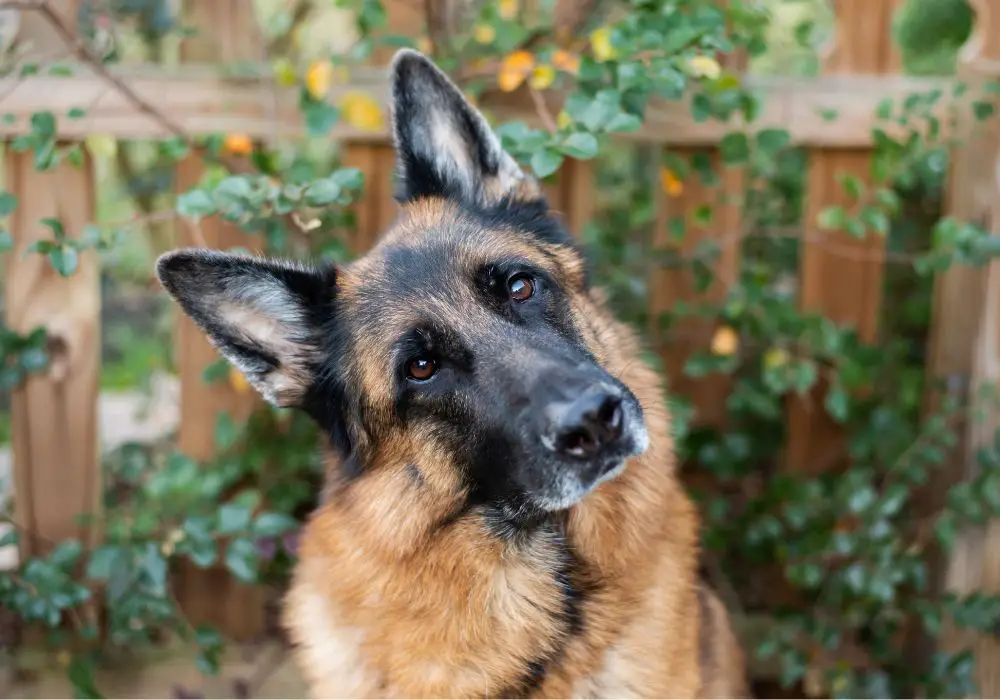
Puppies don’t verbalize it, but teething can be uncomfortable. Here are some signs your German Shepherd is losing puppy teeth:
- Loose teeth – Gently wiggle teeth to check for looseness as their roots start dissolving. You may find shed teeth lying around.
- Swollen, inflamed gums – The gums around erupting teeth often look puffy, red, and irritated.
- Increased chewing – Puppies tend to chew more on toys, furniture, and body parts like hands and ankles during teething. The pressure provides relief for sore gums.
- Drooling – Excessive drooling is common due to teething irritation and inflammation.
- Eating issues – Sore, sensitive teeth may temporarily make eating hard kibble difficult. Your puppy may avoid eating or prefer soft foods.
- Cranky behavior – Teething discomfort often makes puppies more whiny, irritable, and prone to behavior changes.
Warning Signs to Watch For
While the above symptoms are normal during the teething process, contact your veterinarian promptly if you notice:
- Loss of appetite beyond 24 hours
- Repeated vomiting or diarrhea
- Lethargy or depression
- Swelling of the face, mouth, or jaw
- Discharge from the eyes or nose
- Bleeding from the gums that doesn’t subside after 10-15 minutes
These can indicate an underlying health problem requiring medical attention, rather than just normal teething effects. Puppies can become dehydrated if eating and drinking habits change due to dental discomfort.
Caring for Your German Shepherd Puppy While Teething
The teething phase brings discomfort for your German Shepherd puppy. Here are some tips for making them more comfortable:
- Provide abundance of safe chew toys to satisfy the increased urge to chew and relieve pressure on gums. Chilled rubber teething toys can provide soothing relief.
- Try offering frozen washcloths for the puppy to chew on. The cold temperature helps numb sore gums.
- Soften dry kibble with warm water or canned food to make eating less painful.
- Gently rub the gums and new teeth with a puppy toothbrush and toothpaste to clean them and massage inflamed gums. Never use human toothpaste which can make dogs ill.
- Give ice cubes for teething puppies to lick on. The cold feels good on irritated gums. Monitor to prevent large chunks being crunched and swallowed.
- Discuss using safe oral pain relievers with your veterinarian if your puppy seems very uncomfortable.
With patience and extra TLC during this developmental phase, soon your German Shepherd will have a full set of healthy adult teeth and be back to chewing, playing, and eating normally. Avoid forcibly pulling out loose puppy teeth yourself, as this can damage the emerging permanent teeth. Let the teeth come out on their own.
Long-Term Care of Your German Shepherd’s Teeth
While teething causes short-term discomfort for puppies, establishing good lifelong dental care habits early on is crucial. Daily tooth brushing, dental chews, regular professional cleanings under anesthesia, and addressing any signs of dental disease quickly are essential to ensuring your German Shepherd keeps their teeth into old age.
Why Do Adult German Shepherds Lose Permanent Teeth?
While it’s normal for puppies to lose their milk teeth as adult teeth erupt, it’s not typical or desirable for adult German Shepherds to lose their permanent teeth. However, German Shepherds can start losing their adult teeth later in life for several reasons:
Periodontal Disease
By far the most common cause of tooth loss in mature dogs is due to periodontal disease. Periodontal disease is a progressive bacterial infection of the tissues surrounding and supporting the teeth, including the gums, periodontal ligaments, and jaw bone.
In the early stage called gingivitis, plaque and tartar buildup on the teeth causes gum inflammation. As gingivitis worsens and spreads deeper below the gumline, it destroys the tissues holding teeth in their sockets. This later stage is termed periodontitis.
Over time, periodontitis causes painful loosening of the teeth, receding gums, bone loss around tooth roots, and eventually tooth loss as the infection compromises the integrity of the socket and supporting bone.
Periodontal disease typically develops slowly, starting as early as age 2-3 in dogs. Without proper dental care, plaque buildup causes escalating gum infection, dysfunction, and tooth loss in pets.
Tooth Injuries and Trauma
Injuries to the teeth and mouth can also cause permanent tooth loss in adult German Shepherds. Fractures from bites or blunt trauma often damage the tooth’s pulp tissue. Once pulp necrosis sets in, the tooth must be treated or extracted.
Working German Shepherds that participate in police work, schutzhund, or protection sports have higher risks of knocking teeth out or causing dental fractures while apprehending suspects. Take care to avoid damage during vigorous play or training.
Abnormal Tooth Wear
Excessive abrasion slowly wears down enamel over time, exposing the sensitive dentin and pulp inside the tooth. The most commonly affected teeth are the canines and carnassial molars.
Pets that aggressively chew hard objects like rocks, cages, or crate bars are prone to abnormal tooth wear. Damaged, worn teeth become extremely painful and prone to infection, eventually necessitating extraction.
Less Common Causes
Other less frequent causes of adult tooth loss include:
- Tooth root abscesses
- Oral cysts and tumors impacting tooth roots
- Developmental or congenital tooth abnormalities
- Severe gingivitis eroding gum and bone
- Jaw fractures
Regardless of the cause, take your German Shepherd to the vet promptly at the first sign of damaged, loose or missing teeth. Early intervention is key to saving salvageable teeth and preventing worsening problems.
Potential Problems Tooth Loss Causes for German Shepherds
Missing teeth can impact your German Shepherd’s quality of life in several ways:
Oral Pain
Dogs are stoic about showing pain, but diseased teeth and receding inflamed gums are often very painful, sometimes severely. This chronic pain will take a toll over time.
Chewing and Eating Difficulties
Missing molars or canines make chewing and eating hard kibble more difficult. Dogs may drop food from their mouth while attempting to chew. Swallowing larger pieces also increases choking risks.
Damage to Opposing Teeth
When a tooth is lost without prompt extraction, the opposing tooth can over-erupt into the vacant space. This throws off the bite alignment and causes abnormal wear and dental issues in the remaining teeth.
Oral Bone Loss
Periodontal disease chews away at the tooth sockets and jaw bone as infection progresses. Bone loss weakens the foundation for teeth and cannot be reversed once damaged extensively.
Increased Plaque and Tartar Buildup
Rotated, crooked, or overlapping teeth that don’t align properly allow more plaque accumulation in the crevices. This accelerates dental disease.
Changes to Facial Structure
Extensive tooth loss causes mild to moderate changes to the shape and structure of the head and face over time as bone remodels to stabilize the jaw after extractions.
With prompt veterinary attention and ongoing dental care, most dogs can retain functional dentition throughout life and avoid these devastating consequences. Don’t wait until advanced dental disease sets in to seek treatment.
Getting Veterinary Dental Care for Your German Shepherd
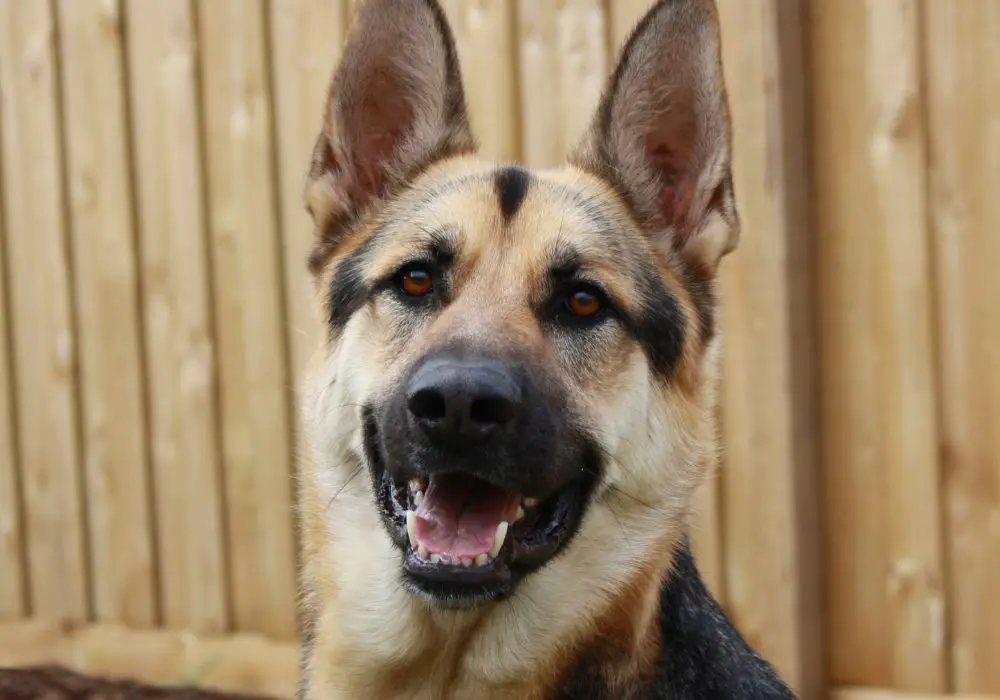
Take your German Shepherd to the veterinarian promptly if you notice any of these signs:
- Chipped, cracked, or discolored teeth
- Teeth abnormally worn down
- Swollen or bleeding gums
- Loose or missing teeth
- Bad breath, pus, or red gums
- Difficulty eating, dropping food from mouth
- Loss of multiple teeth
- Whining or irritability around the mouth
- Reluctance to have mouth touched or teeth brushed
Your vet will perform a complete oral exam and full-mouth dental x-rays as needed to assess the extent of disease and determine a treatment plan which may include:
- Professional dental cleaning above and below the gumlines
- Oral surgery to extract damaged non-salvageable teeth
- Root canals or crowns to save compromised but treatable teeth
- Prescribed antibiotics and pain medication
- Custom at-home dental care regimen
With diligent daily home dental care and regular professional cleanings, you can help your German Shepherd keep their teeth for a lifetime. Don’t wait for them to show obvious outward signs, as internal dental disease is often well-advanced by the time symptoms arise.
Frequently Asked Questions
Q: At what age do German Shepherd puppies start losing their baby teeth?
A: German Shepherd puppies typically start losing their milk teeth and getting permanent teeth around 4-6 months of age. The new adult teeth erupt under the gums, pushing the puppy teeth out as they grow.
Q: How long does teething last in German Shepherd puppies?
A: The overall teething process lasts from about 4 months to 7 months old. The most intense stage is 16-24 weeks as the puppy teeth fall out and larger adult teeth come in. Some milder discomfort may continue up to 7 months.
Q: Should I help pull out my German Shepherd puppy’s loose teeth?
A: No, you should allow puppy teeth to come out on their own once naturally loosened by erupting permanent teeth. Forcibly extracting teeth can damage the gums and developing adult teeth underneath. Only a vet should extract teeth if necessary.
Q: My German Shepherd puppy’s gums are bleeding – is this normal with teething?
A: It’s common for puppy gums to bleed slightly as teeth push through during teething. Gum inflammation and irritation can lead to minor bleeding. However significant or prolonged bleeding warrants a veterinary visit to identify potential issues.
Q: Why might an adult German Shepherd need teeth extracted?
A: The most common reason adult German Shepherds require tooth extraction is due to periodontal disease destroying the supporting structures of the teeth. Tooth injuries, abnormal wear, and other issues can also necessitate pulling badly damaged permanent teeth.


